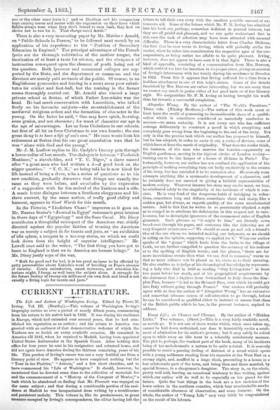Altogether Wrong. By the author of "The World's Furniture." Three
vols. (Tinsley Brothera.)—The author of this work must at least have the credit of possessing no inconsiderable share of a qualifi- cation which is sometimes considered as materially conducive to success—we mean audacity. It is not every one who has sufficient courage deliberately to construct a novel in which everything and everybody goes wrong from the beginning to the end of the story. Not only is this the precise task which our author has proposed to himself, but he has adopted, in order to carry it out, a series of devices, some of which have at least the merit of originality. What does the redder think, for instance, of the man who marries the heroine—apparently an English gentleman, moving in the highest circles of London society— turning out to bo the keeper of a house of ill-fame in Paris ? Un- fortunately, however, our author has not confined the application of his principle of making everything turn out badly exclusively to the events of his story, but has extended it to its narration also. He scarcely even attempts anything like a systematic development of a character, and he certainly does not succeed in giving a faithful representation of modern society. Whatever interest his story may excite must, we fear, be attributed solely to the singularity of the incidents of which it con- sists. He is very fond of the dangerous habit of indulging in reflec- tions, sometimes long and diffuse, sometimes short and sharp, like a sudden gun, but always, as regards quality, of the same unsubstantial nature. Add to this that he writes in so persistently slipshod a style as to compel us to attribute his deficiencies in this respect not to care- lessness, but to downright ignorance of the commonest rules of English grammar. Such phrases as "it might bo him," aro literally sown broad-cast through his pages, and sentences like the following are of very frequent occurrence :—" We should as soon go and ask a friend's idea of the one whom we intended making our helpmate, as we should in acting on the opinion, supposing we applied for it." When our author speaks of the " gauge " which leads from the baths to the village of Lank, we are further compelled to question the accuracy of his notions as to the spelling of English words; and the phrase, "there are far more incredulous events than what we can find in romance," warns us that no more reliance can be placed on his views as to their meaning. He also enables us to judge of his chronological knowledge by represent- ing a lady who died in 1850 as reading "Guy Livingstone" at least two years before her death, and of his geographical acquirements by the statement that a fugitive from Switzerland to Italy chose the Sim- plon Pass, because " it led to the Grimed Pass, over which he could get into Italy without going through France." Our readers will probably agree with us that the author of "Altogether Wrong" has an extensive and somewhat irksome course of self-education to go through, before ho can be considered as qualified either to instruct or amuse that class of the British public which ho has, in the present instance, aspired to address.






























 Previous page
Previous page